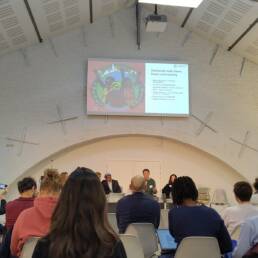Sustainable agriculture is at the heart of the 2030 Agenda and is a fundamental step to securing zero hunger.
Many of the SDGs address issues related to agriculture, and SDG indicator 2.4.1, defined as the “percentage of agricultural area under productive and sustainable agriculture”, is fully dedicated to it and based not only on environmental criteria but also on economic and social dimensions. This means, for example, that if the well-being of those working on a farm is not considered, then a farm cannot be sustainable.
Investing in sustainable rural development is also important to allow people to migrate only out of choice, and never out of necessity. Many individuals and families migrate from rural areas due to food insecurity, to lack of social protection, and to seeing no viable option for moving out of poverty within their own communities. Resilient rural livelihoods can create conditions that allow communities to live in peace and prosperity in their homelands.
On 21 June 2019, Agricultural Ministers from the African Union (AU) and the European Union (EU) will meet in Rome, Italy to decide whether to endorse the proposed Africa-Europe Agenda for Rural Transformation as a guide to its future work on rural development and agriculture in Africa. This is a major opportunity for the Ministers to promote socially inclusive and sustainable food systems.
Ahead of the AU-EU Agriculture Ministerial Conference, we have joined forces with other civil society organisations to raise our concerns about the Africa-Europe Agenda for Rural Transformation and to make recommendations on ways to support an inclusive and sustainable agri-food sector in Africa.
Together with Action Aid, Eclosio, Act Alliance EU, Oxfam, Terra Nuova, COMI, CCFD Terre Solidaire, Alliance 2015, Iles de Paix, Broederlijk Delen and SOS Faim, Caritas Europa calls upon AU and EU Agricultural Ministers to:
- Respect Policy Coherence for Development commitments;
- promote a rights-based approach to agricultural development;
- move towards ecologically and socially sustainable models that benefit smallholders;
- regulate business activities; and
- promote the full and effective participation by small-scale producers, women, and marginalised local actors on issues that directly affect their livelihoods and food security.
More information
Luísa Fondello
International Cooperation Officer
Tel: +32 (0)2 235 03 93
lfondello@caritas.eu




